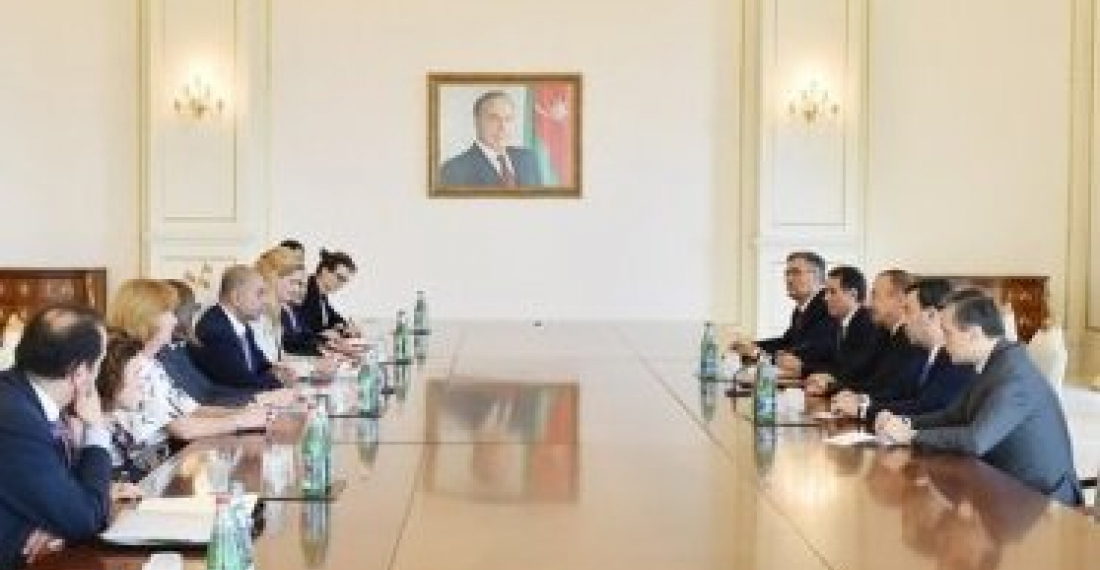It is the duty of European institutions, especially the European parliament, to reach out to the Azerbaijani people and this can only be done if there is a sustained dialogue with the Azerbaijani government and Azerbaijani institutions.
This is a commentary prepared by the political editor of commonspace.eu
A delegation from the European parliament this week was in Azerbaijan to participate in a meeting of the EU-Azerbaijan Parliamentary Co-operation Committee, a framework for dialogue between the European Parliament and the Parliament of Azerbaijan. Usually such meetings go unnoticed, but given the fact that relations between the EU and Azerbaijan have in recent years been strained, and those between the European Parliament and the Parliament of Azerbaijan nearly broken, the visit and the discussion held were of significant importance.
The problems are related to Azerbaijan’s domestic politics, and especially its treatment of opponents, and what many in Europe consider to be the unfair imprisonment of a number of activists and human rights and democracy defenders. Many have subsequently been released, but several others, including the leader of the REAL movement, Ilgar Mammadov, and various young activists from the NIDA movement remain serving long prison sentences.
A tough, but rather awkwardly worded statement from the European Parliament last year triggered a sharp reaction in Baku, including the withdrawal of Azerbaijan from Euronest – the parliamentary framework between the European parliament and the six Eastern partnership countries.
As reported by the Azerbaijani media, a statement was issued on Wednesday at the end of the MEPs visit to Baku by the co-chairs of the EU-Azerbaijan Parliamentary Cooperation Committee Sajjad Karim and Samad Seyidov. The statement says:
“The PCC had not met since 2012. The primary aim of this meeting was to restore and facilitate future dialogue to constructively review the current basis of relationship between the European Parliament with Milli Majlis and the direct implications of this on EU-Azerbaijan relations”.
Hinting at the nature of the discussions the statement said,
“The PCC and all other interactions provided an opportunity for areas of mutual shared understandings to be explored and areas where disagreement had occurred to be examined and views of both sides shared.”
The statement makes a direct reference to the meeting between the members of the European parliament and President Ilham Aliev. In his meeting with the MEPs president Aliev was very candid in expressing his country’s displeasure at the attitude of various western institutions towards Azerbaijan. The statement says
“The PCC Co-Chairs welcome the open, critical and constructive expression of viewpoint by President Aliyev. Particular note is made of European Parliament resolution 2015/2840(RSP) of 10 September 2015 and Milli Majlis resolution dated 14 September 2015 and their consequences for the relations between the European Parliament and Milli Majlis. The delegation of the European Parliament regrets that for one year no dialogue took place between the European Parliament and Milli Majlis. Both sides hope moves to restore normal dialogue can be undertaken expeditiously.”
The final part of the statement refers to wider geo-political issues. It states,
“We clearly understand all the geopolitical realities and challenges that Azerbaijan faces today, notably the Armenian-Azerbaijani Nagorno Karabakh conflict and we have honour to clearly express that the European Parliament fully supports the territorial integrity and sovereignty of Azerbaijan, as stated by the European Parliament in its resolutions of 20 May 2010 and 23 October 2013 and UN Security Council resolutions 822, 853, 874 and 884 of 1993. “
Clearly, Azerbaijan does not dislike all that comes out of the European parliament in the past.
Opponents of the Azerbaijani government have criticised the visit of the MEPs to Baku. They are wrong. The Parliamentary Co-operation Committee between the European parliament and Azerbaijan exists so that issues and problems can be discussed, and should be the primary mechanism to review bilateral relations. That there are issues in the way Azerbaijan conducts its domestic politics, and shortcomings in the way it is implementing the commitments it took on as a member of the Council of Europe and the OSCE, that are of concern to European Parliamentarians, is without doubt. That the European Parliamentarians should raise these concerns unequivocally and as often as necessary is a must. But this needs to be done in a spirit of friendship not one of hostility. The political leadership of Azerbaijan on its part must stop being so paranoic of criticism, and show that it is ready to play by the rules that it has itself agreed to.
There is a lot of good-will towards Azerbaijan in Europe. Azerbaijan should not squander this. On the other hand, in Azerbaijan, many people, especially the younger generation, see Europe as a modernising force that is able to assist the country in its transformation, not only in the political but also in the economic sphere. It is the duty of European institutions, especially the European parliament, to reach out to the Azerbaijani people and this can only be done if there is a sustained dialogue with the Azerbaijani government and Azerbaijani institutions. As correctly emphasised in the statement issued at the end of the MEPs visit to Baku this week this must be based on “mutual respect, equality and understanding”.
One hopes this visit marks a new begining in EU-Azerbaijan relations.
source: This commentary was prepared by the political editore of commonspace.eu
photo: President Ilham Aliev with the official delegation of the European Parliament in Baku on 20 September 2016






